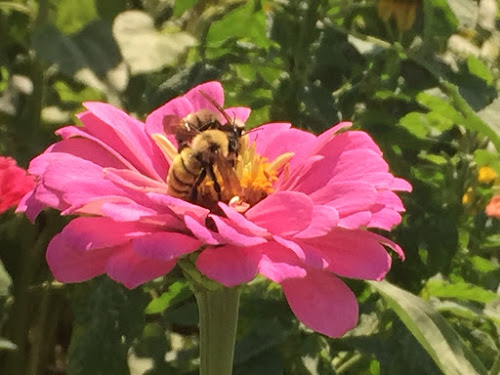Two days ago, I finished Caroline Moorehead's A Train in Winter, the story of French women sent to German concentration camps, women who worked to undermine German occupation in their country. Not everything that happened to them came at the hands of Germans. Many were arrested, imprisoned, tortured, and died because of French collaborators, people along with German orders to keep their families safe. while others were rewarded for their actions.
I have read many books on WWII. I have heard talks given by concentration camp survivors. This book was different. I had to put this book down more than once, walk away. I dreamt of being held against my will. These are stories of loss and suffering beyond anything I have read about before.
I have spent much time healing from my own losses. They are many, but they are nothing compared with what these women experienced. The few who returned home mourned executed husbands, bombed homes, children who grew up in their absence. And the French people were slow to recognize the role they played in the suffering by the women, fellow French citizens. Who should be punished? What measures should be taken to hold them accountable?
Many women never could reacclimate to a life after after Auschswitz and Ravenbruck, in part because the return home took away the very thing that allowed them to survive: their reliance on each other. In the camps, when one women's meager food rations were withheld, the others all chipped in pieces of bread, often summing up to more food than she could eat. Women who worked as secretaires for the SS risked their own lives to find safe jobs for others. They hid sick women from the guards. Over and over they commited acts to guarantee survival, not necessarily their own but someone, anyone. It was the only way to keep themselves alive.
About Christmas 1943, Moorehead writes:
"Food, saved from parcels from France and vegetables pilfered from the gardens were made into
a feast of beans and cabbage, potatoes with onion sauce and poppy seeds. The women ate
little, having lost the habit of food, but the sight of so much to eat made them cheerful."
I copied this passage into my journal. I was so struck by the vision of starving women, deprived of food, that the mere sight of it was enough to sustain them.
Some children of women who did not survive refused to believe that their mothers were not coming home. Moorehead reports one child who went to the train station for years, despite being told that her mother had died. I am reminded of Anna Karenina's son, who refuses to believe she is dead, the lie that has been told to him by his father. Nine-year-old Seryozha looks for his mother's face in every woman he sees on the street, so certain is he that she is still alive.
One dead mother, one living mother, two motherless children.
We have all faced losses, some greater than others, but I suspect none felt more deeply to the individual than their greatest ones. Much harder to let go of than the thing itself is our own hope for how we wished it had been. I had lunch with my sister yesterday, and we spoke of much we can hurt each other and those closest to us when we refuse to let go of this hope for what we cannot have. In 2014, our parents sold their home, after months spent cleaning, throwing away and selling stuff that had been accumulated over several decades: a secretary desk belonging to my grandfather that crumbled to sawdust when my sister reached out to touch it, a broken ceramic windchime that was a gift to my dad, hundreds of pieces of well-seasoned lumber, walnut and cherry and oak, crates of license plates, and church statuary of the saints.
And tools.
At one point, we counted 14 pitchforks. I may be off in that number, but does it matter? Isn't 2 or 3 or 4 too many, especially when you don't have anything to pitch?
It's been almost a year, and still my father won't stop talking about what he has lost. And my sister said something so wise yesterday. She said, how do you make someone want something he doesn't want for himself?
In a few days, I find out if my short story collection might be published. For those of you who don't know, my collection Three Sisters: A Hybrid Collection has been selected as a finalist in the Sou'wester First Book Award with Dock Street Press. I want to win. I didn't think it mattered to me. I am playing all the mind games I can to convince myself otherwise. But I want so much to get that email that says, Congratulations! Some days, some hours, I am more rational about it then others. I tell myself, if I lose, then I will go back in and revise one more time, maybe I'll ask for feedback about how I can improve the piece. I'll read the winning book to see if I can glean any wisdom from it, and to support the press and the author.
At other moments my thoughts spin out of control and I am imagining how it will feel to hold my book in my hand, as if that is the thing I have been wanting. I imagine myself being interviewed on Fresh Air (when I confess that to another writer, she says, why do we writers always imagine that?). I dream about which story I will pick for readings.
I do not want to lose. But I don't get to make that choice. The only choice I have is to decide whether or not to be cheerful at the mere sight of a feast set on the table before me.





















